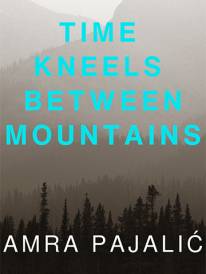Jonathan Mostow Surrogates Interview
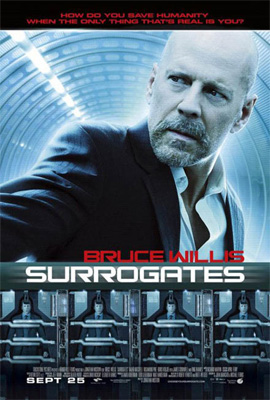
Surrogates DVD
Cast: Bruce Willis, James Cromwell, Radha Mitchell, Ving Rhames.Director: Jonathan Mostow
Genre: Mystery, Drama, Thriller, Action, Science Fiction.
Rated: M
Running Time: 85 Minutes
FBI Agent Tom Greer, played by action star Bruce Willis, risks it all in pursuit of a killer loose in a world where everyone lives their day-to-day lives vicariously through their surrogate robots. Don't miss this action-packed science fiction thriller, Surrogates, released to DVD and in the Blu-ray and DVD Combo Pack, 3 March 2010.
Surrogates is set in the futuristic world of 2017, where people live out their lives from home through the use of life-like remote controlled physically perfect replica's of themselves. In this strange and isolating world, it has meant the creation of a life without fear, pain or crime. But the first murder in years has now shaken the safety of this world to the core.
FBI agent Tom Geer is assigned to the investigation, and given the victim Jarod Canter is the son of Dr Lionel Canter (James Cromwell), the inventor of surrogates, suspicions of the motive are mounting. But what is even more troubling for Greer, is that Canter's unexplainable death occurred alongside the murder of several police officers.
Greer and his partner Jennifer (Radha Mitchell) are soon led in their investigation to an organisation known as The Dreads; a group devoted to the destruction of surrogates, and their leader The Prophet (Ving Rhames). But while chasing a suspect, Greer is hurt by the same device that killed Canter known as an O.D. (Overload Device). Discovered by his wife in his home, Greer is lucky to survive but his surrogate is permanently damaged.
Greer must now continue the investigation without the use of his surrogate, a strange and unsettling experience after years of shelter from the outside world.
Soon after, the investigation takes another twist with the discovery that the O.D. was originally designed by the military. But with the weapon still out there, the path to truth becomes more complex and dangerous for Greer as he is lead back towards Dr Canter in his pursuit of the truth.
With the lives of all users of surrogates dangerously at stake, Greer uncovers a shocking conspiracy that will have you on the edge of your seat right up to the final climax.
With a brilliant hard-edged performance by Bruce Willis, and in tune with the classic science fiction genre established by Philip K. Dick with Do Androids Dream of Electric Sheep, Surrogates is an action packed DVD not to be missed this summer.
Don't miss your chance to own Surrogates - available on DVD and in the Combo Pack*, 3 March 2010 - undoubtedly a classic science fiction thriller to collect!
* Combo pack contains a Blu-ray Disc plus a DVD copy of the film in a single package.
Special Features:
In addition to director commentary, SURROGATES also includes the spectacular, special music video, 'I Will Not Bow', by American rock band Breaking Benjamin.
Interview with Jonathan Mostow
Jonathan Mostow made his motion picture debut as writer and director on 1997's 'Breakdown,' the taut thriller starring Kurt Russell as a man whose wife mysteriously vanishes in the desert after their car breaks down. The critically acclaimed film debuted atop the U.S. box office its opening weekend.He followed with another No. 1 box office success, the WWII submarine action-thriller 'U-571,' starring Matthew McConaughey and Harvey Keitel. The film, which he also wrote, garnered two Academy Award® nominations, winning an Oscar® for Best Sound Editing.
Jonathan Mostow next directed 'Terminator 3: Rise of the Machines,' starring Arnold Schwarzenegger, which earned $450 million in global receipts in the continuation of one of Hollywood's most fruitful franchises.
He executive produced David Fincher's 1997 thriller 'The Game' (on which he also developed the script with longtime collaborators and Harvard classmates John Brancato and Michael Ferris), then returned to the director's chair for the Emmy award-winning HBO miniseries, 'From the Earth to the Moon,' directing Tom Hanks in the finale segment entitled 'La Voyage Dans La Lune.'
In 2004, Jonathan Mostow was voted 'Action Director of the Year' by the World Stunt Association. Most recently, he served as executive producer on the blockbuster Will Smith superhero drama, 'Hancock.'
Jonathan Mostow began his filmmaking career as a student at Harvard University, where he directed numerous award-winning shorts and documentaries. His first writing and directing breakthrough was the 1991 Showtime television thriller 'Flight of Black Angel,' which earned him a Cable ACE nomination for Best International Movie or Special.
In addition to his film and television work, Jonathan Mostow also recently created, for Virgin Comics, The Megas, a four-issue graphic novel series set in an alternative reality, in which the United States is ruled by a monarchy.
How did you direct your actors to have the 'surrogates' effect? What kind of suggestions would you give?
Jonathan Mostow: When I made Terminator 3, I learned something about directing actors to behave like robots. And one of the key things I learned is that if an actor tries to play a robot, he or she risks playing it mechanically in a way that makes the performance uninteresting. So how I approached the issue in that film and in Surrogates was instead to focus on erasing human idiosyncrasies and asymmetries -- in posture, facial expressions, gait, etc. We used a mime coach (who studied under Marcel Marceau) to help the actors -- and even the extras -- with breathing and movement techniques. The actors really enjoyed the challenge.
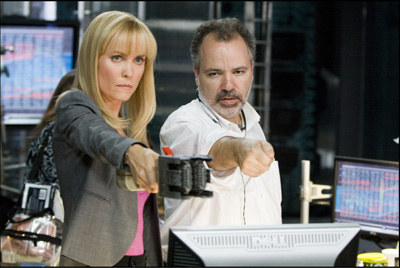 Do you think that the release of movies will continue to take place in theaters or, as the quality standards is constantly increasing at home with technology; movies might start to be released instantly on different Medias or directly on the internet in the future?
Do you think that the release of movies will continue to take place in theaters or, as the quality standards is constantly increasing at home with technology; movies might start to be released instantly on different Medias or directly on the internet in the future? Jonathan Mostow: As you probably know, this is a hot topic of conversation in Hollywood right now. It seems that we're heading toward the day that films will be released in all platforms simultaneously, albeit with a cost premium to see it at home. But I hope that theater-going doesn't end -- I think that watching movies on the big screen with an audience is still the best format and also an important one for society. Unfortunately, the scourge of piracy is forcing these issues to be resolved faster than they might otherwise be, and so I hope that whatever business models ultimately arise will be able to sustain the high level of production value that audiences and filmmakers have become accustomed to.
Which other features can we find inside the Extras of the DVD and BD?
Jonathan Mostow: The DVD and Blu-ray both have my commentary and the music video by Breaking Benjamin. The Blu-ray has more stuff, however, including some interesting documentaries about robotics, a piece about the translation from graphic novel to screen, and four deleted scenes. (Plus, of course, the Blu-ray looks better!)
What's your recipe for creating a good action movie?
Jonathan Mostow: I wish there was a recipe! It would make my life so much easier. Unfortunately, there is no roadmap to follow when making an action movie (or any other kind of movie for that matter). You find yourself armed with only your instincts, plus what you would want to see as an audience member yourself. The place I begin is with story. If the audience doesn't care about that, then it doesn't matter how amazing the spectacle is. My central philosophy is that people go to the movies to be told a story, not to see stuff blow up.
Do you believe your film made the audiences rethink some aspects of their lives?
Jonathan Mostow: I hope so. Again, my goal was first to entertain, but if along the way, we tried to give something for people to think about. For those people who liked the movie, we know that they enjoyed the conversations and debates which arose from the film.
Are there any sci-fi movies that were inspirational to the tone, look and feel you wanted to strike with Surrogates?
Jonathan Mostow: For the look and feel of this movie, I found inspiration in some black and white films from the 60s -- early works of John Frankenheimer -- plus the original Twilight Zone TV show. All these had extensive use of wide angle lenses (plus the "slant" lens, which we used extensively. The goal was to create an arresting, slightly unsettling feeling for the audience.
What's the most rewarding thing you've learned or taken from making this movie?
Jonathan Mostow: Making this movie had made me much more conscious of how much time I spend on the computer. Before I made this movie, I could easily spend hours surfing the internet and not realise how much time had passed. Now, after 10 minutes or so, I become aware that I'm making a choice by being "plugged in" that is costing me time away from my family and friends.
Did you read the comics before you started making the movie? If so, what did you like about them the most?
Jonathan Mostow: Yes, it was the graphic novel that inspired me to make the movie. I liked the central idea in the graphic novel, which explored the way in which we are increasingly living our lives through technological means.
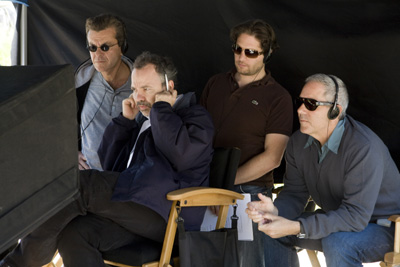 What do you personally think of the Blu-ray technology?
What do you personally think of the Blu-ray technology? Jonathan Mostow: I LOVE Blu-ray. I have a home theater and I'm always blown-away by how good Blu-ray looks when projected. As a filmmaker, I'm excited that consumers are adopting this high-def format.
This world is tech-addicted; do you think it is a plague? Should we could we control this?
Jonathan Mostow: Interesting question -- and I speak as someone who is addicted to technology. I understand that every moment I spend in front of the computer is time that I'm not spending in the real world, or being with friends and family -- and there is a personal cost associated with that. Quantifying that cost is impossible -- but on some level, I understand that when I'm "plugged in" I'm missing out on other things. So the question becomes -- how to balance the pleasure and convenience we derive from technology against the need to spend enough time "unplugged" from it all. I don't know the answer. And as a civilization, I think we're all struggling to figure it out. We're still in the infancy of the technological revolution. Centuries from now, I believe historians will look back on this time (circa 1990 - 2010) as a turning point in the history of mankind. Is it a "plague"? No. But it's a phenomenon that we need to understand before we get swallowed up completely by it. I don't want to sound like I'm over-hyping the importance of this movie, because after all, Surrogates is first and foremost intended to be a piece of entertainment, but I do think that movies can help play a role in helping society talk about these issues, even if sometimes only tangentially. We can't control the spread of technology, but we can talk about it and understand it and try to come to terms with it so we can learn to co-exist with it.
In Surrogates every character in the frame looks perfect: was it a big technical problem for you? How did you find a solution?
Jonathan Mostow: I talk about that on the DVD commentary -- it was a big challenge. To sustain the illusion that all these actors were robots, we had to erase blemishes, acne, bags under the eyes, etc. In a sense, the actors were the visual effects. As a result, there are more VFX shots than non-VFX shots in the movie.
What is your favorite technical gadget, why?
Jonathan Mostow: Currently, my favorite gadget is the iPhone, but the toy I'm really waiting for is the rumored soon-to-be released Apple tablet.
Do you prefer "old-school", handcrafted SFX or CGI creations?
Jonathan Mostow: I think if you scratch beneath the surface of most filmmakers (myself included); you will find a 12 year old kid who views movie-making akin to playing with a giant electric train set. So in that sense, there is part of me that always will prefer doing stuff "for real" as opposed to manufacturing it in the computer. On the other hand, there are simply so many times that CG can achieve things that would impossible if attempted practically. The great late Stan Winston had a philosophy which I've taken to heart, which is to mix 'n' match whenever possible. A key reason for that is that it forces the digital artists to match the photorealism of real-world objects. One thing I try to avoid in my films are effects that have a CG "look" to them. The challenge is never let the audience get distracted by thinking that they're watching something made in a computer.
This is a so-called virtual roundtable interview. Wouldn't you agree that in the context of 'Surrogates' this is quite ironic? However, virtual technique like this is quite practical, isn't it?
Jonathan Mostow: Great question! However, why do you call it "so-called"? I'd say this is 100% virtual, wouldn't you? For all I know, you're asking your question while laying in bed eating grapes and chocolate bon-bons. (Please let me know if I'm correct, BTW.)
How close did you try to keep the film to the graphic novel?
Jonathan Mostow: We talk about that in one of the bonus features on the Blu-ray. The novel was interesting in that it was highly regarded, but not well-known outside a small community of graphic novel enthusiasts. So that meant that we weren't necessarily beholden to elements in the graphic novel in the way that one might be if adapting a world-renowned piece of literature. Even the author of Surrogates acknowledged that changes were necessary to adapt his novel to the needs of a feature film. Hopefully, we struck the right balance. Certainly, I believe we preserved the central idea -- which was to pose some interesting questions to the audience about how we can retain our humanity in this increasingly technological world.
Does the rapid technological evolution help making sci-fi movies easier, or harder, because the standards are higher and higher?
Jonathan Mostow: From a practical standpoint, it makes it easier because the digital/CG revolution makes it possible to realise almost anything you can imagine. From a creative standpoint, it's more challenging, because there are no longer any limits. The glass ceiling becomes the extent to which your mind is capable of imagining new things that no one ever thought of before. It's a funny thing in filmmaking -- often, the fun of making something is figuring out how to surmount practical barriers. As those barriers get erased, then those challenges disappear.
Are you afraid, that the future we see in the movie could be real someday soon?
Jonathan Mostow: Well, in a sense, we're already at that point. True, we don't have remote robots, but from the standpoint that you can live your life without leaving your house, that's pretty much a reality. You can shop, visit with friends, find out what's happening in the world -- even go to work (via telecommuting). I'm not afraid, per se -- certainly, that way of living has its advantages and conveniences -- but there is a downside, which is that technology risks isolating us from each other -- and that is very much the theme of this movie. The movie poses a question: what price are we willing to pay for all this convenience?
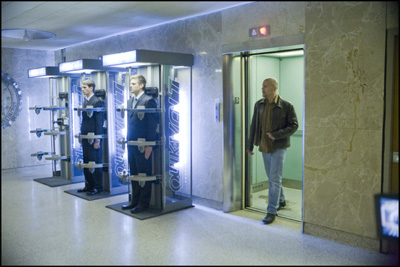 Jonathan, you've worked with some of the most famous action stars to ever grace the silver screen, Arnold, Bruce, Kurt...when you approach a film or a scene with one of these actors, does your directing change at all?
Jonathan, you've worked with some of the most famous action stars to ever grace the silver screen, Arnold, Bruce, Kurt...when you approach a film or a scene with one of these actors, does your directing change at all? Jonathan Mostow: I've been very lucky to work with some great movie stars of our time. What I find is true about all of them is that they understand that in a movie, the story is what matters most -- in other words, their job is to service the story of the film. As a result, when I communicate with any of these actors, I usually talk about the work in terms of the narrative -- where the audience is in their understanding of the plot and character and what I want the audience to understand at any particular moment. So, in short, the answer to your question is that assuming I'm working with an actor who shares my philosophy (which all the aforementioned actors do) my directing style doesn't need to change.
Which aspect of the filmmaking process do you like the most? Directing the actors? Doing research? Editing?
Jonathan Mostow: Each phase has its appeal, but for me personally, I most enjoy post-production. For starters, the hours are civilised. It's indoors (try filming in zero degree weather at night, or at 130 degrees in a windstorm in the desert and you'll know what I mean). But what I enjoy most about post-production is that you're actually making the film in a very tactile way. You see, when you're finished shooting, you don't yet have the movie. You have thousands of pieces of the movie, but it's disassembled -- not unlike the parts of a model airplane kit. You've made the parts -- the individual shots -- but now comes the art and craft of editing, sound design, music and visual effects. Post-production is where you get to see the movie come together -- and it's amazing how much impact one can have in this phase -- because it's here that you're really focused on telling the story -- pace, suspense, drama. To me, that's the essence of the filmmaking experience.
Are any of the props from Surrogates currently on display in your house?
Jonathan Mostow: That question makes me chuckle, because to the chagrin of my family, I'm a bit of a pack rat and I like collecting junk from my films. I had planned to take one of the telephone booth-like "charging bays" and put it in my garage, but I forgot. Thanks for reminding me -- I'll see if it's still lying around someplace!
What was the most difficult element of the graphic novel to translate to the film?
Jonathan Mostow: I'll give you a slightly different answer: The most difficult element to translate successfully would have been the distant future, which is why we decided not to do it. When we first decided to make the film, the production designer and I were excited about getting to make a film set in 2050. We planned flying cars, futuristic skyscapes -- the whole nine yards. But as we began to look at other movies set in the future, we realised something -- that for all the talent and money we could throw at the problem, the result would likely feel fake. Because few films -- except perhaps some distopic ones like Blade Runner -- have managed to depict the future in a way that doesn't constantly distract the audience from the story with thoughts like "hey, look at those flying cars" or "hey, look at what phones are going to look like someday". We wanted the audience thinking only about our core idea -- which was robotic surrogates -- so we decided to set the movie in a time that looked very much like our own, except for the presence of the surrogate technology.
The film does a magnificent job of portraying the difficulty and anxiety of characters forced to reintroduce themselves to the outside world after their surrogates have experienced it for them, which is certainly relevant in an era where so many communicate so much online. Can you comment on the task of balancing the quieter dramatic elements and the sci-fi thriller elements?
Jonathan Mostow: When I was answering a question earlier about sound, I spoke about "dynamic range", which is the measure of the difference between the loudest and quietest moments. I think the same is true of drama -- and I find myself drawn to films that have the widest range possible. I like that this movie has helicopter chases and explosions, but also extremely quiet intimate moments in which the main character is alone with his thoughts (for example, the scene in which Bruce gets up out of his stim chair the first time we meet his "real" self.) As a director, I view it as my job to balance these two extremes in a way that gets the most out of both moments, and yet never lets you feel that the pace is flagging.
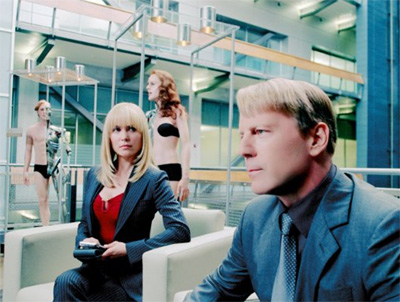 On the movie's you've directed, you have done some rewrites. Was there anything in Surrogates you polished up on, or was it pretty much set by the time pre-production got under way?
On the movie's you've directed, you have done some rewrites. Was there anything in Surrogates you polished up on, or was it pretty much set by the time pre-production got under way? Jonathan Mostow: In the past, I've typically written my movies (Breakdown and U-571 were "spec" screenplays I wrote on my own and then subsequently sold, and then brought in collaborators once the films headed toward production.) On T3 and Surrogates, I did not work as a writer (both movies were written by the team of John Brancato and Michael Ferris). Surrogates was interesting in that the script was finished only one day before the Writers Guild strike of 2008, so by the time we started filming (which was shortly after the strike ended), there had been far less rewriting than would typically have occurred on a movie by that point.
Do you have a preference in home audio: Dolby Digital or DTS? And are you pleased with Blu-ray's ability to have lossless audio?
Jonathan Mostow: Personally, I prefer Dolby Digital, but only because my home theater is optimised for it. Obviously DTS is also a great format. I am thrilled with all the advances in Blu-ray audio.
Boston's mix of old architecture and new, sleek buildings works wonderfully well for "Surrogates." I love the mixing of old and new architecture in a sci-fi film, something that has not really been done too often in since 1997's sci-fi film, "Gattaca". Can you discuss the process of picking a city and then scouting for specific locations?
Jonathan Mostow: Thank you -- I talk about that in my DVD commentary. Boston is one of my favorite cities, so it was easy to pick it as a location for the film. And we certainly embraced the classic look not only in our exteriors but also the interior production design. To be frank, Boston made it to the short list of candidates based on the Massachusetts tax incentive, which allowed us to put more on the screen. Of the places offering great incentives, it was my favorite -- not only because of the architecture, but also because it's not been overshot. Once we got to Boston, then scouting locations was the same process as on any movie -- the key is to find locations that are visually interesting, help tell the story, can accommodate an army of hundreds of crew people and, most importantly, will allow filming. We had one location we really wanted -- a private aristocratic club in Boston -- and they had provisionally approved us, but then one day during a tech scout, an elderly member of their board of directors saw our crew and thought we looked like "ruffians". Our permission was revoked and we had to find another location. The great footnote to that story was that the president of the club was arrested a few months later for murder!
I imagine that before writing and creating the world of Surrogates you studied the topic. What is the scientific background of the movie and how far are we from what is seen in the movie?
Jonathan Mostow: I did a fair amount of research for the movie, but really, what I discovered is that the best research was simply being a member of society in 2009. If you take a step back and look at how the world is changing, you realise that the ideas behind surrogacy have already taken root. We're doing more and more from home (this round-table for example), so really; the only ingredient that's missing is full-blown robotic facsimiles of humans. Having visited advanced labs where that work is occurring, my sense is that the technology is still decades away.
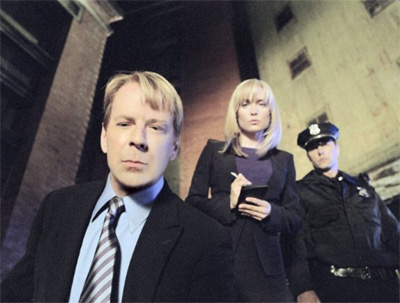 As far as I know in the movie there was some digital rejuvenation of Bruce Willis for his role as a robot. How did you do it and what do you foresee for this technique? Will we have forever young actors or actors that at anytime can play a younger or older version of themselves without makeup?
As far as I know in the movie there was some digital rejuvenation of Bruce Willis for his role as a robot. How did you do it and what do you foresee for this technique? Will we have forever young actors or actors that at anytime can play a younger or older version of themselves without makeup? Jonathan Mostow: For Bruce, we approached his surrogate look with a combination of traditional and digital techniques. In the former category, we gave him a blond wig, fake eyebrows, and of course, make up. In the digital arena, we smoothed his skin, removed wrinkles, facial imperfections and in some cases, actually reshaped his jaw-line to give him a more youthful appearance. Could this be done for other actors? Sure. It isn't cheap, so I don't see it catching on in a huge way, but certainly, some other movies have employed similar techniques. Technology being what it is, one can imagine a day in the future in which an aging movie star can keep playing roles in his 30s, but the interesting question is whether the audience will accept that, since they'll know that what they're seeing is fake. In the case of Surrogates, we discovered with test audiences that if we went too far with Bruce's look, it was too distracting, so in certain cases, we had to pull back a bit.
Do you supervise aspects (video transfer, extras or other elements) of the home video (DVD/Blu-ray) release for your films?
Jonathan Mostow: Yes. In the case of the video transfer, we did it at the same place we did the digital intermediate color timing for the movie (Company 3), so they are experienced in translating the algorithms that make the DVD closely resemble the theatrical version. I am deeply involved in that process, as is my cinematographer. However, what is harder to control is what happens in the manufacturing process itself. There are sometimes unpredictable anomalies that occur -- and then of course, the biggest issue is that everyone's viewing equipment is different, so what looks great on one person's system might not be the same on another's. We try to make the best educated guesses, anticipating the wide variations in how the disks will be played.
Mr. Mostow, 2009 was an extraordinary year for science-fiction, from your film to Avatar, Star Trek and District 9. Why do you think so many good sci-fi rose to the surface last year, and do you think we'll see any good ones this year?
Jonathan Mostow: First of all, thank you for mentioning our film in the same breath as those other movies -- all of which I loved. I don't think it's a coincidence that 2009 was a good year for sci-fi. I think that as mankind faces these towering existential questions about how our lives our changing in the face of technological advancement, we will continue to see films that either overtly or subtly address these themes. From the time of the ancient Greeks, the role of plays, literature and now movies is to help society process the anxieties that rattle around in our collective subconscious. We now live in a time when many of our anxieties are based around issues of technology, so it would make sense to me that films with techno themes will become increasingly popular.
Was there ever a discussion to create a Surrogates-themed video game? The plot lends itself to a decent companion game.
Jonathan Mostow: There are no discussions that I know of, but I agree, it would make the basis for a cool game.
Each of your films has boasted sound mixes that many have considered classic examples of sound design. Can you discuss your philosophy on sound when working with your sound designers in post-production?
Jonathan Mostow: I really appreciate this question because sound is something I care deeply about and I believe that mixers I've worked with will probably tell you that few directors get as involved with sound as I do. Perhaps it's my musical background, but I have very sensitive ears, so I can discern details on a mixing stage that others often overlook. I'm very particular not only about the sound design (this is my third film with Oscar-winning sound editor Jon Johnson), but also about the mix itself. I think a good soundtrack helps immerse the audience in the movie. Ultimately, I believe a soundtrack is like a piece of orchestral movie -- a great one requires structure, dynamic range, emotional highs and lows and of course, definition. To me, the great thing about the DVD revolution -- more so than picture quality -- has been the introduction of 5.1 surround sound to the home.
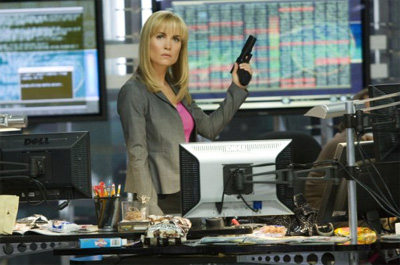 How involved was KNB Effects? What did they bring, if anything, to the films effects designs?
How involved was KNB Effects? What did they bring, if anything, to the films effects designs? Jonathan Mostow: KNB is a top-flight company that specialises in prosthetic devices for movies and creature design. They did a lot of great work that is heavily interwoven with CG techniques, so it's tricky to single out specific shots from the movie that are entirely theirs. They were great to work with.
"Surrogates" plot revolves around an important issue in the current times - the growing need of anonymity and increasing loss of real human contact. Do you think we're going in the way you've portrayed in "Surrogates"?
Jonathan Mostow: I think I answered this question earlier, but I'm re-addressing it here because I like your reference to the "growing need of anonymity". That's a big sub textual theme in Surrogates and also a pretty fascinating aspect the internet. Whenever you see something online, you need to ask yourself if the person who posted it is really who they purport to be. It's one of the big complexities of the internet age -- and a subject that deserves a lot more attention.
I really enjoyed listening to your audio commentary on the DVD. Talk about your approach to it. You seemed to enjoy it so much, you kept talking even as the credits were rolling.
Jonathan Mostow: Thanks for the compliment. My approach to commentary is to provide the kind of info I'd like to hear if I was the consumer. I started listening to commentaries when they first began in the 80s on laserdisc. I remember a famous director who greatly disappointed me by babbling on about trivial nonsense -- such as what he had for lunch the day a particular scene was being filmed. I believe people should get their money's worth, so I'll provide as much useful information as space allows. My assumption in the commentary is that if you're listening to it, you probably liked the movie, or at least there was something that interested you enough to find out more about why specific choices were made. So I try to tailor my comments for that audience. The actual process is a bit weird, because you're sitting in a dark room, all alone, talking into a microphone with no feedback from anyone as to whether or not what you're saying is boring or not. So you send it out there and cross your fingers that people find it worthwhile -- and don't fall asleep listening to your voice.
How do you approach the promotional campaign for a film and in what way do you enjoy participating most in promoting one of your films?
Jonathan Mostow: I greatly enjoy the press phase of the film -- but not for reasons you might expect. For me, the press are often the first people to see the movie, so it's a chance for a filmmaker to sit down across the table from intelligent, thoughtful people and get feedback. (Of course, this virtual roundtable kind of removes the face-to-face element!) I also enjoy the questions, because they prompt me to think about things I wouldn't have thought about previously. For example, someone today asked about the thematic connections between T3 and Surrogates. But when I think about that, I realise that my other films have also been about man and technology. Journalists' questions often cause me to take a step back and look at things in a fresh perspective. Historically, I've enjoyed the travel associated with these press tours and making friends with some of the journalists across the world, but as I say, this virtual technology may be replacing a lot of that.
I found the distinction between the surrogates and their human handlers interesting. Can you expound upon why such a drastic difference?
Jonathan Mostow: The difference was logical. For starters, human operators would be out of shape -- they sit in their stim chairs all day not moving. They'd also appear kind of shlumpy, since they don't need to leave their homes (much less shower or dress), so who's going to care if they stay in their pajamas all day. On the surrogate side of the equation, we imagined that based on human nature, in most cases, people would opt to operate idealised versions of themselves -- so if their surrogate looked in a mirror, for example, they'd see this fantastic-looking version of themselves. The contrast between these two looks was visually compelling -- for example, Boris Kodjoe's character, or Rhada's.
One of the deleted scenes shows the surrogates' prejudice towards a human being among them. Why was this particular element cut?
Jonathan Mostow: The scene you reference (Bruce and Radha in a bar) was cut, but the underlying idea is still in the movie -- although admittedly not as strongly as had we kept the scene. (There are references in the movie to "meatbags" and other moments that indicate a hostility and prejudice toward those who reject the surrogate way of life.) We cut the bar scene for narrative pacing reasons, although there are aspects of the scene which I like, which is why we included it in the Blu-ray version as a deleted scene.
Jonathan Mostow Surrogates Interview Part 2
www.femail.com.au/jonathan-mostow-surrogates-interview-part2.htm
MORE
- Mission: Impossible Fallout
- Glenn Close The Wife
- Allison Chhorn Stanley's Mouth Interview
- Benicio Del Toro Sicario: Day of the Soldado
- Dame Judi Dench Tea With The Dames
- Sandra Bullock Ocean's 8
- Chris Pratt Jurassic World: Fallen Kingdom
- Claudia Sangiorgi Dalimore and Michelle Grace...
- Rachel McAdams Disobedience Interview
- Sebastián Lelio and Alessandro Nivola...
- Perri Cummings Trench Interview



